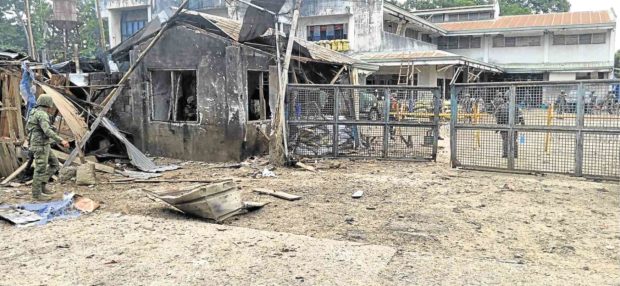
DEADLY BLASTS Military officials say one of the two men who tried to bomb an Army camp in Indanan, Sulu province, whose devastated guard house is shown in this photo, was a Filipino Abu Sayyaf member. They believe it was probably a suicide attack, but say the bombs could have also been denoted remotely. —CHAO TIAO YUMOL/CONTRIBUTOR
MANILA, Philippines — A Filipino militant who joined the Abu Sayyaf bandit group five years ago has been identified as one of the two suicide bombers who attacked an Army camp in Sulu province last week, killing eight people, a senior military official said on Tuesday.
The 23-year-old militant, Norman Lasuca, was identified by his mother, said Maj. Gen. Cirilito Sobejana, chief of the Western Mindanao Command (Westmincom).
Sobejana said Lasuca left his family in Barangay Asturias in Jolo, Sulu’s capital, in 2014 to join an Abu Sayyaf faction led by commander Hajan Sawadjaan, the suspected mastermind of Friday’s attack in Indanan town and who is aligned with the Islamic State (IS) group.
“This is the only time that she saw him again,” Sobejana said of Lasuca’s mother. The family claimed the severed head of the militant and buried it, he said.
Poverty and lack of education might have driven Lasuca to the Abu Sayyaf, which lures recruits with money and guns, Sobejana told the Associated Press.
Gen. Benjamin Madrigal Jr., Armed Forces chief of staff, said DNA tests were still needed to ascertain the identities of the two bombers.
According to military officials, Lasuca’s bomb detonated after he was stopped by soldiers at the gate of the 1st Battalion Combat Team (BCT) camp at Indanan. The blast killed three soldiers and three civilians.
The second bomber managed to dash into the camp but was shot by soldiers. He was heard yelling “Allahu akbar!” (God is great!) before his bomb exploded.
Possible remote detonation
The attack also wounded 12 soldiers and 10 civilians.
The second militant had Caucasian features and was suspected to be a son of a foreign jihadist with Moroccan blood, who died also in a suicide bombing attack in Basilan province last year, according to Sobejana.
Sobejana said the bombs could have also been set off remotely.
“We are not a hundred percent certain that it was a suicide bombing, but the probability is high,” the official added.
On Monday, Defense Secretary Delfin Lorenzana said the attack was “obviously a suicide bombing.”
It was the third suicide bombing in the country in just a year after the July 2018 Basilan attack that killed 11 people and the two bombs that ripped through the Jolo Cathedral and its grounds in January, killing 23. The IS claimed the attacks.
Analysts have said suicide attacks could be taking root in the Philippines, driven by IS influence.
“It is an escalation, but it’s also a sign of increased radicalization,” Agence France-Presse quoted Zachary Abuza, Southeast Asian security expert at National War College in Washington, as saying.
Security forces also announced the arrest of a suspected foreign militant believed to be “knowledgeable” about improvised explosive devices.
Maj. Gen. Amador Corpus, director of the Criminal Investigation and Detection Group of the Philippine National Police, said Kenyan national Cholo Abdi Abdullah was arrested on Monday in his hotel room in Iba, Zambales province.
‘Very dangerous’
He described Abdullah as a “very dangerous” member of an al-Qaida sleeper cell.
Authorities found a 9 mm pistol, an improvised explosive device, a hand grenade and components for a bomb in Abdullah’s room, Corpus said.
The Kenyan, who has been hiding in the country since 2017, was enrolled at a flying school in Pasay City that had a flight training center in Iba. He was short of 20 flying hours to complete his aviation course.
“This was a priority operation because it [was] urgent considering that he was described by [our] foreign counterparts as ‘very dangerous,’” Corpus said.
The arrest was carried out by military and police intelligence agents, and their “foreign counterparts,” he added.
Corpus refused to say where Abdullah was being detained. —With reports from AP and AFP